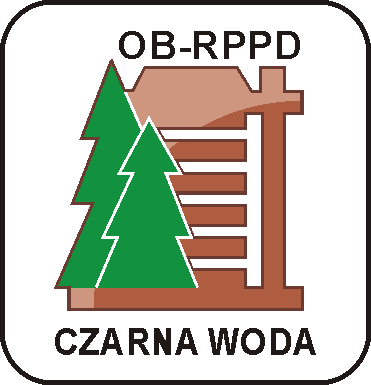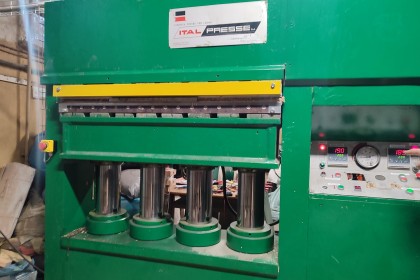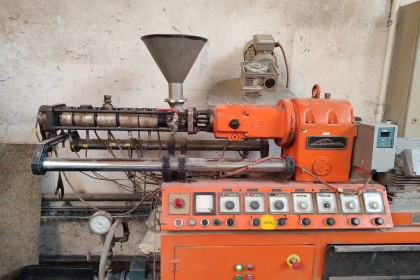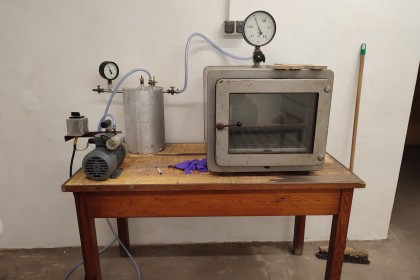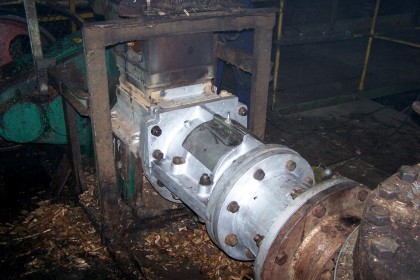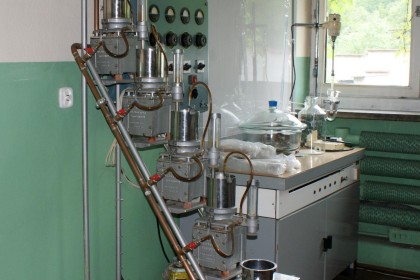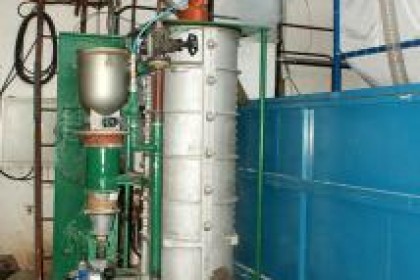Technical-Technological Laboratory
Technical-Technological Laboratory
The Technical-Technological Laboratory conducts research on the suitability of various lignocellulosic raw materials for the production of wood-based panels, including post-use wood, various types of industrial waste, and annual plants. Its activities also include the technological, energy, and technical assessment of existing technological processes as well as new or modified machinery, developing proposals for technological or structural changes based on conducted research and measurements. Furthermore, it carries out exploratory work on the production of new products based on lignocellulosic materials while simultaneously managing waste materials from other industrial sectors. The main goal of these activities is to develop technologies for producing panels and materials from currently waste materials burdening the natural environment.
Offered services include:
- Modeling and Simulation of Structures and Processes
- Machine learning;
- Use of Finite Element Analysis (FEM) for joints in monolithic and hybrid materials;
- Intelligent control of production processes based on machine learning for hybrid process connections (e.g., thermoforming and injection molding of plastic, hydroforming and injection molding of plastic);
- Durability simulation of new materials and components;
- Optimization of technology reliability for joining;
- Modeling and simulation of in-situ forming and coupled processes;
- Simulation of fiber processes and preforms adapted for load flow;
- Simulation of the application of curtains from composite fiber products;
- Optimization algorithms for conducting fiber processes and component designs.
- Resource-Efficient Production Technologies
- Optimization of technological processes using multidimensional resource efficiency based on the objective function;
- Reduction of industrial waste;
- Saving of raw materials in the automotive industry;
- Utilization of waste heat from the forming process.
- Hybrid Technologies and Devices
- Developing new hybrid technologies focused on application in the automotive industry;
- Designing new production devices for hybrid technologies;
- Forming hybrid multilayer metal printed plates;
- Forming hybrid multilayer tubes and profiles of metal composites through hydroforming;
- Forming multi-material stampings from sheet metal combined with hybrid metal composites;
- Hydroforming of multi-material tubular conduits made from hybrid metal composites;
- Hybrid joining methods, combining mechanical, thermal, and chemical technologies (e.g., bonded rivets; capacitor discharge welding and adhesive bonding; laser welding and adhesive bonding).
- Energy-Efficient Assembly and Joining Processes in Mass Production
- Fast joining technologies for hybrid materials;
- Joining by magnetic pressing for the production of hybrid multi-material semi-finished products (e.g., hybrid plates for deep drawing, hybrid tubular conduits for hydroforming, and profiles for electric mobility applications);
- Virtual forecasting of production process chains from deep drawing to joining, assembling, and painting;
- Support systems for production preparation;
- Thermal/mechanical joining in mixed constructions;
- Rivetless forming strategies;
- Adding brittle materials; e.g., aluminum/magnesium castings with aluminum/steel;
- Waste-free production process chain.
- Composite Components with Integrated e-Mobility Functions
- Testing composites with reinforced fibers and functional integration;
- Designing new solutions and components in electric vehicles;
- "Smart Fabrics" textile processing;
- Manufacturing functional fabrics for immersion in fiber components of composites;
- Textile production processes adapted to shape-similar structures;
- Thermal technologies and thermosetting materials for pressing reinforced laminates;
- Development and technological evaluation of structural regeneration of hybrid structures made from lightweight materials.
- Wood and Wood-Based Materials
- Physical, mechanical, and hygienic tests of board products and wood-based and composite materials;
- Technologies for the production and manufacturing of wooden and composite materials;
- Processing of wood materials and tools;
- Development of new production technologies for wood-based materials;
- Dust removal;
- Adhesives and adhesive technology;
- Modernization of defibration equipment for the panel industry;
- Environmental tests in the workplace (dust, noise, microclimate, vibration, harmful factors...);
- Pilot scale technology in the production of new products and new technologies;
- Wood protection;
- Study of metal structures and alloys.
- Recycling and Regeneration
- Recycling of hybrid materials;
- Environmental impact assessment of new materials used in the automotive industry;
- Regeneration of used materials and components for further production.
